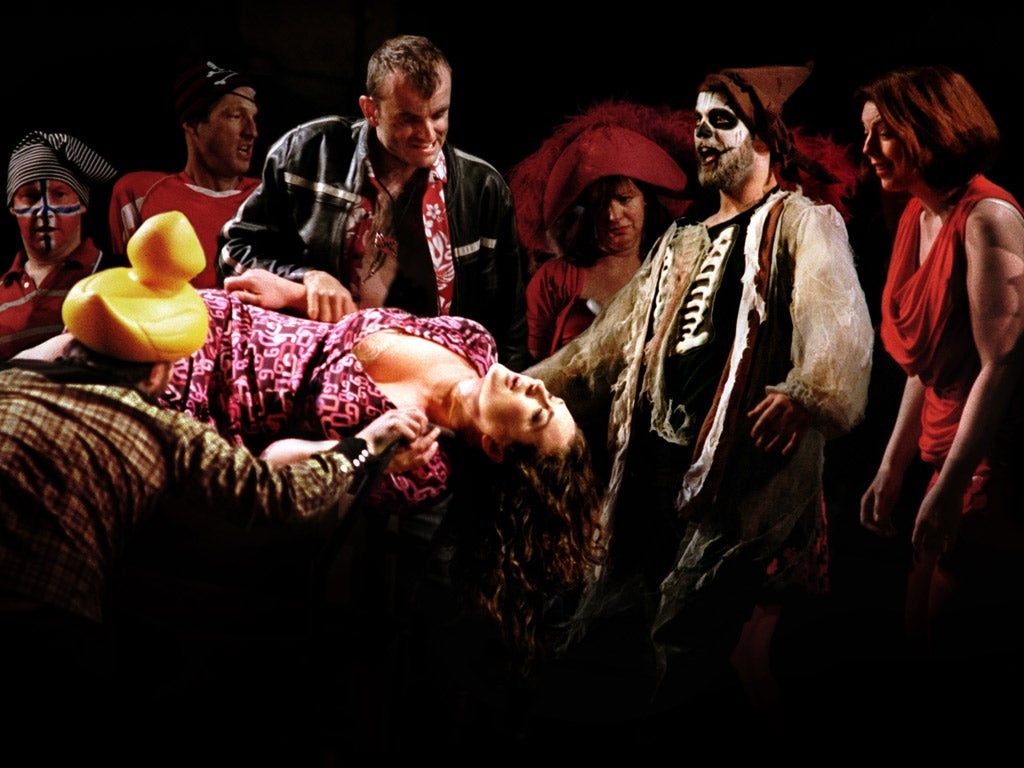The Flying Dutchman, Coliseum, London LSO/Eotvos, Barbican Hall, London
The orchestra is electrifying, the singing bright and beautiful, but if you want the usual story, dream on

Agreat deal of dreaming goes on in Wagner's operas. The composer himself had such an active subconscious that his wife, Cosima, noted no fewer than 421 of his dreams in her diaries. On the page and on the stage, his heroes and heroines dream of perfect love, perfect redemption, perfect oblivion, perfect music, perfect poetry. Peppered with symbols of repressed desire – miniature ships squeezed into bottles, their red sails flagging up an acquaintance with Jungian colour theory – Jonathan Kent's production of The Flying Dutchman opens with a dream and ends with a nightmare of splintered glass.
Kent is at odds with Wagner's gothic fantasy from the start, sometimes productively, sometimes not. Tucked under a candy-pink duvet, 10-year-old Senta (Aoife Checkland) dreams the overture into being, conjuring James Creswell's Byronic Dutchman from the pages of her storybook, as though to replace her dull, distant father, Daland (Clive Bayley). While the orchestra plays with furious energy and precision under conductor Edward Gardner, Senta's dormer window dissolves into a tumult of sea-spray and scudding moonlit clouds (video projection by Nina Dunn), which dissolves in turn to reveal the hulk of Daland's boat and an encounter between living and undead sailors, again a dream.
Still girlishly hugging the storybook to her chest, the adult Senta (Orla Boylan) is mocked and bullied by the female workers in Act II, forced to drink alcohol, and pawed and sexually assaulted by the sailors in Act III. Mary (Susanna Tudor-Thomas) becomes a bottle-blonde souvenir-factory supervisor, Erik (Stuart Skelton) a security guard whose closed-circuit television cameras offer little insight, the Steersman (Robert Murray) a would-be rapist. There's humour at play in Kent's direction and Paul Brown's designs – all these women manipulating all these tiny erections of mast and sail, all these drunken sailors cavorting about with inflatable palm-trees and mermaid breasts. But so vivid is the portrait of a modern-day seaside hell-hole that the Dutchman's tragedy is diluted. As Creswell sings, before dropping from sight through a trap door, "You cannot know or dream who I am."
Senta's death is not a grand sacrifice but a desperate suicide with a smashed bottle, tragic but unmoving, an act of escape. There's no interval, but musical standards are high nonetheless. Under Gardner, whose first Wagner opera this is, the orchestral articulation is electrifying, the woodwind and brass supple, the pacing dynamic, while the ENO chorus is at its brightest and most focused. Creswell presents a handsome, resonant, even tone without suggesting anguish or tenderness. These are the preserve of Skelton, whose cavatina has pathos and beauty. Boylan has traded some of her lustre for strength, sounding wiry and edgy but fearlessly carrying the heart of this heartless production to its conclusion. The life and death of a lonely, disbelieved little girl in a two-bit town is an interesting subject for an opera but it is not the subject of this opera.
Peter Eotvos stepped in for an indisposed Pierre Boulez in a Barbican performance with the LSO and Christian Tetzlaff that perfectly illustrated the elegance of understatement. This was a delicately coloured, coolly tempered reading of Debussy's Three Nocturnes, the strings pellucid, the flute and harp chaste, each accent placed just so, unhurried and subtle. The seduction continued in Szymanowski's Violin Concerto No 1, its fecund, Fauvist colours and predatory figures offset by moments of pure elevation, pure dazzle, pure freedom. Tetzlaff's peerless intonation and icy harmonics suggested the otherworldliness of an ondes martenot. The cadenza was breathtaking, the encore (from Bartok's valedictory Sonata for Solo Violin) a doleful, solemn, private, whispered chaconne. Opulence tumbled into decadence in Scriabin's priapic Fourth Symphony, "The Poem of Ecstasy", its dialogue between throbbing force and panting pliancy far too revealing of the composer's sweaty theories on "the Male-Creator and the Woman-World". It's said that Henry Miller loved it.
'The Flying Dutchman' (0871 911 0200) to 23 May
Critic's choice
Motets by Josquin bring Flanders to Greenwich as Harry Christophers and The Sixteen's choral pilgrimage, The Earth Resounds, reaches London's Old Royal Naval College Chapel (Wed). Kirill Karabits, Nikolai Lugansky and the Bournemouth SO stir up a storm in Khachaturian, Rachmaninov and Wal- ton at the Lighthouse, Poole (Wed) and Guildhall, Portsmouth (Thu).
Subscribe to Independent Premium to bookmark this article
Want to bookmark your favourite articles and stories to read or reference later? Start your Independent Premium subscription today.

Join our commenting forum
Join thought-provoking conversations, follow other Independent readers and see their replies